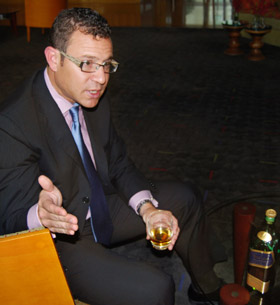Brett Graff’s Mixed Company
Shots of Inspiration from a Selection of Miami’s Business Leaders


This is a series of business interviews conducted by Brett Graff, a former U.S. government economist who today reports on money, power and the economic forces affecting real people. Dubbed “The Home Economist,” her work has appeared in The Miami Herald, Glamour, Maxim, Harper’s Bazaar, Redbook, Ladies’ Home Journal, Parents and Cosmopolitan. Online, she’s the financial expert for TheNest.com and writes for Bankrate.com, Yahoo! finance, Fox Business News, MSN.com, TheHomeEconomist.com and more. She’s been quoted by Women’s Health, The New York Times, The Fiscal Policy Institute, The Los Angeles Times, The Christian Science Monitor, Wikipedia and has appeared on CNN, PBS, CNBC and Headline News.
Executive search consultant Juan Luis Betancourt, 39, is used to hiring people. But after appearing for two episodes on The Apprentice with Donald Trump this season, he’s gotten some experience in firing them, too.

Betancourt was invited into America’s most famous boardroom because he’s made a career out of hunting down executives. Working at Korn/Ferry International, he’s retained by billion-dollar businesses to fill the kind of positions considered jewels in any economy – those with yearly salaries starting at $250,000 and sometimes stacking up to $750,000.
We caught up with Betancourt after work and sipped with him a glass of Johnnie Walker Blue Label, a scotch suitable for the top corporate guns he places. And we pried from him the secrets to conquering that corner office.
How do you like Johnnie Walker Blue Label?
This scotch is wonderful. I really enjoy the Blue Label. My first experience with Johnnie Walker was with Black Label, just after college. It’s a funny story actually. I was in Caracas, Venezuela and I went to a bar. They all drink whiskey there and this bar was filled with the city’s elite – everyone either made a lot of money or came from a family that had made a lot of money. So to fit in, I order a Johnnie Walker Black Label. But when I went to pay, I pulled out an American Express green card. Everyone around me had a black card. There I was, ordering a high-brow drink and paying with a green card. The card gave me away.
In Miami, what are companies looking for from their senior level executives?

We are hired for finding leaders. In Miami, companies are usually looking to fill a functional role with distinct skill set. Most of these jobs command a master’s degree of some sort, but where you go isn’t as important as what you’ve done. I’m surprised that the majority of people I meet every day didn’t go to a top school. They’re people who have specific skill sets that can take a company globally – not just Latin America but Asia and Europe, as well.
I’m doing a CFO search right now for the largest Hispanic owned company in the country, based in the Florida market, and they want a CFO that has experience with Latin America, who’s a CPA with experience at a “Big Four” accounting firm and also with a company’s initial public offering. There are so many boxes to check that we went through 350 executives and only seven of them qualify.
What got those seven people in the door?
I can tell if someone is executive material on the first phone call. Executives are succinct when they speak to you. They summarize their careers in two seconds. An executive doesn’t go into detail. When telling me what they’ve achieved, they do it with a few key points and mention the metrics behind their accomplishments, namely the value they added to the company thanks to a project they headed or a decision they made.
What should aspiring executives do to improve their chances of getting into the corner office?
Instead of watching your boss give presentations, ask – perhaps at your next performance review — if you might address the board of directors or the CEO. Then, you’ll want to ask for feedback, and do it again – as many times as you possibly can. Communication skills are critical. A lot of times, someone’s perfect on paper but guess what? In an interview they don’t communicate well.
Also, we don’t think of people as executives unless they’re managing 6 to 10 people. You have to constantly ask yourself two things, “How big is my team?” and “How big is my budget?” Then work on getting those two numbers bigger.
You mentioned you were once an executive yourself – what do you know now that you wish you’d known then?
I didn’t know about executive search. Whether you’re in finance, marketing or supply chain — there’s someone in executive search who concentrates in that area, seeking out executives for new positions. Find out who works in your industry and send them your information. Develop a relationship with that person.
Most people only want to leverage an executive search consultant when they’ve just been fired or they want a change. But companies are not looking for the distressed candidate and often they don’t want unemployed people. Networking needs to be done when you’re happy with your job, not when you’re miserable. Keep in touch with the executive search consultant in your industry and constantly send your updated resume. Then when a job comes up, perhaps you’ll be a candidate.
How did you manage to get on The Apprentice?
Donald Trump and his producers wanted more credibility on the show than the talent advice he was getting in the boardroom. His son really isn’t objective and really isn’t trained in finding executives. So they went out looking for someone with a large firm and mine is the largest in the world. I got a call from Mark Burton Productions, the president of NBC reality TV and Donald Trump.
See the profiles for all of the young business leaders featured in Brett Graff’s Mixed Company Season 1.
Photography by Paola Padovan


